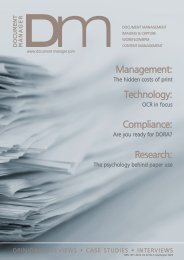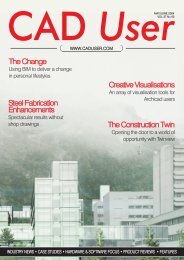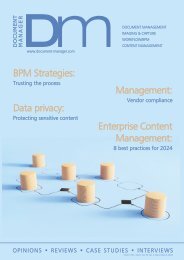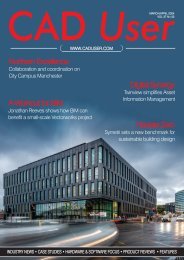DM Sep-Oct 2022
Create successful ePaper yourself
Turn your PDF publications into a flip-book with our unique Google optimized e-Paper software.
Dm OPINION: E-INVOICING<br />
and authorities in the EU have been<br />
required by law to receive PEPPOL<br />
invoices.<br />
The UK is one of 31 European nations<br />
that have now started to implement<br />
electronic invoicing. PEPPOL claims to<br />
allow a single e-Procurement link to the<br />
outside world dealing with current and<br />
future suppliers, both large and small in<br />
the UK and globally. A supplier requires<br />
just one connection to an 'Access Point'<br />
and PEPPOL provides a common link for<br />
e-ordering, e-invoicing, and electronic<br />
credit notes. Currently it is set up for<br />
the NHS and its vendors. Through this<br />
Access Point and link a business can<br />
send Invoices and other business<br />
document to all NHS clients and any<br />
other PEPPOL-connected commercial<br />
partners in the UK or internationally.<br />
MANAGING ACCESS<br />
An Access Point is a connection to a<br />
secure transmission point - in the case<br />
of Europe the PEPPOL network. The<br />
supplier purchases access from an<br />
Access Point service provider which<br />
allows them to exchange electronic<br />
documents with other companies that<br />
are linked to the same or another<br />
Access Point. The Access Points have a<br />
directory which allows them to route<br />
the XML based electronic invoice to<br />
another access point that has a<br />
connection with a company's customer.<br />
This should make it somewhat easier<br />
for a UK company to trade throughout<br />
Europe, since it no longer needs to deal<br />
with different national formatting<br />
standards - and if adopted widely in the<br />
UK, will help automate invoice<br />
processing. But it is not only Europe<br />
that is adopting this. The US has an<br />
initiative under way supported by the<br />
Federal Reserve which is supporting the<br />
Business Payments Coalition to create a<br />
similar system to PEPPOL that is in pilot<br />
at present. It uses commercial banks to<br />
provide the Access Points and it has<br />
plans to expand from invoices to<br />
include remittances, leveraging the<br />
ISO20022 standard that has been<br />
adopted by SWIFT.<br />
Currently there are more than 200<br />
certified Access Points around the world<br />
which form a secure global network to<br />
send (and receive) invoices and other<br />
electronic documents. The Access Point<br />
handles the process of transporting it<br />
to the recipient's Access Point that then<br />
forwards the invoice to the recipient. A<br />
business can choose whatever Access<br />
Point it likes, which could be a PEPPOL<br />
certified one, but it would perhaps<br />
make sense for the UK to get banks to<br />
provide the Access Points, as in the US.<br />
WHAT'S THE <strong>DM</strong> ANGLE?<br />
Why should this be interesting to<br />
companies in the document<br />
management space? On the sending<br />
side, the accounting or ERP system that<br />
the sender is using may or may not<br />
support the UBL standard - but it can<br />
always create a PDF, and there are a<br />
number of parsing tools that can<br />
convert the PDF to the UBL standard.<br />
Some companies will however prefer<br />
to send a paper invoice. After a fraud<br />
attempt involving email hacking that<br />
resulted in a modified PDF file, we<br />
changed back from using PDF's to<br />
sending paper, since that represents<br />
less risk for my company. In this case<br />
the Access points need to provide a<br />
service to convert a paper invoice to a<br />
UBL formatted XML file. This would<br />
represent a new market for scanner<br />
vendors and for software that provides<br />
"Invoice Processing" - usually meaning<br />
analysis and extraction of data from<br />
paper invoices. This might require the<br />
receiving company's Access Point<br />
sending Purchase Order data to the<br />
supplier's Access Point to enable<br />
accurate conversion.<br />
The recipient's Access Point would<br />
normally pass on the UBL file to the<br />
payer. But many AP systems -<br />
particularly in small companies - may<br />
be unable to process a UBL file. The<br />
logical approach, which is what seem<br />
to be happening in the US, is for the<br />
Access Point to convert the UBL file into<br />
a PDF that can be read by the receiving<br />
company. But better would be for the<br />
Access Point to know what<br />
accounting/ERP system is being used<br />
and to format the invoice into the<br />
appropriate format to ingest it<br />
automatically.<br />
After a number of false starts, I<br />
believe this move to 'electronify'<br />
invoices has a chance of success.<br />
However, it will be important to<br />
understand how small companies,<br />
which account for more than 50% of<br />
all UK businesses, create and process<br />
their invoices and for the Access Point<br />
suppliers to offer services to make that<br />
easy. If they just say "Oh, here is an<br />
electronic delivery mechanism" this will<br />
be bound to fail, except maybe for<br />
business to government, where it can<br />
be mandated.<br />
More info: www.xamcor.com<br />
34 <strong>Sep</strong>tember/<strong>Oct</strong>ober <strong>2022</strong> www.document-manager.com<br />
@<strong>DM</strong>MagAndAwards

















